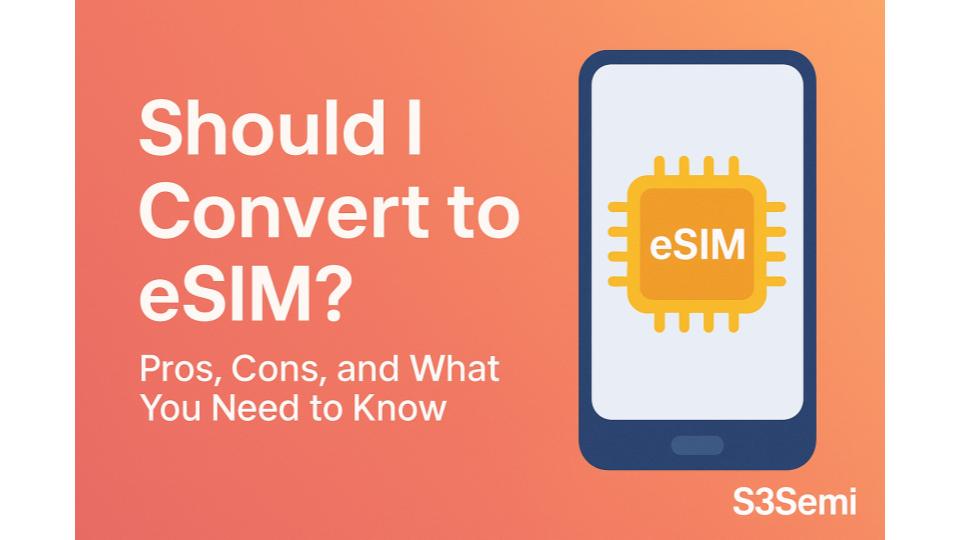📲 With more phones ditching physical SIM trays in favor of embedded SIMs (eSIMs), you might be wondering if it’s time to switch too. eSIM technology is quickly becoming the new standard — but is it right for you?
In this article, we’ll break down what eSIM is, the benefits, potential drawbacks, and help you decide whether you should make the move.
🤔 What Is an eSIM?
An eSIM (embedded SIM) is a digital version of the physical SIM card. Instead of inserting a plastic SIM, your phone connects to your carrier using a downloaded SIM profile stored inside the phone’s hardware.
No physical swapping needed. Just scan a QR code or activate through an app, and you’re connected.

✅ Pros of Switching to eSIM
📦 No More SIM Cards
No need to handle or swap physical SIMs when changing phones or carriers. It’s all done digitally.
📶 Dual SIM Convenience
Most eSIM phones also support a physical SIM — allowing dual SIM use (great for travel, business, or personal/work separation).
✈️ Better for Travel
You can buy local or international eSIM plans without removing your primary SIM. Activate a local data plan before your plane lands.
⚡ Faster Activation
No waiting for a SIM to arrive in the mail — just scan, tap, and go.
♻️ Eco-Friendly
No plastic waste or shipping logistics make eSIMs more sustainable.

⚠️ Cons of Using an eSIM
🔒 Harder to Transfer if Phone Dies
If your phone is lost or broken, transferring your eSIM to a new device can be less straightforward than swapping a physical SIM.
🛠️ Limited Carrier Support
Not all carriers — especially smaller or regional ones — support eSIM yet.
📞 Not All Phones Support It
Older iPhones, Androids, or budget devices may not support eSIM. Always check compatibility first.
🔐 Activation Locks
Some devices may have eSIM profiles locked to a specific carrier, even if you own the phone outright.

📱 Which Devices Support eSIM?
Most modern premium smartphones support eSIM, including:
- Apple: iPhone XS and newer (iPhone 14/15 is eSIM-only in the U.S.)
- Samsung: Galaxy S20, S21, S22, S23 series, Z Flip/Fold
- Google: Pixel 3 and newer
- Motorola, Oppo, Sony: Select models only
Wearables like the Apple Watch and Samsung Galaxy Watch also support eSIM.
🌐 Is eSIM Secure?
Yes — eSIMs are encrypted, carrier-authenticated, and can’t be easily cloned or physically stolen like regular SIMs. Plus, some devices allow remote locking and wiping of your eSIM if your phone is lost or stolen.
🧭 So, Should You Convert to eSIM?
👉 You should switch to eSIM if:
- Your phone supports it
- Your carrier offers reliable eSIM support
- You want easy travel data access
- You prefer a clutter-free, digital setup
- You frequently switch numbers or networks
🚫 You might want to wait if:
- You travel with an old backup phone
- Your carrier doesn’t support eSIM
- You’re uncomfortable with fully digital systems
- You swap SIMs often and value flexibility
📝 Final Thoughts
eSIMs are convenient, secure, and increasingly supported — and they’ll likely become the default in a few years. If your device and carrier support it, switching can simplify your life and streamline your connectivity.
Just make sure you know how to recover or re-download your eSIM if you ever lose access to your phone.


